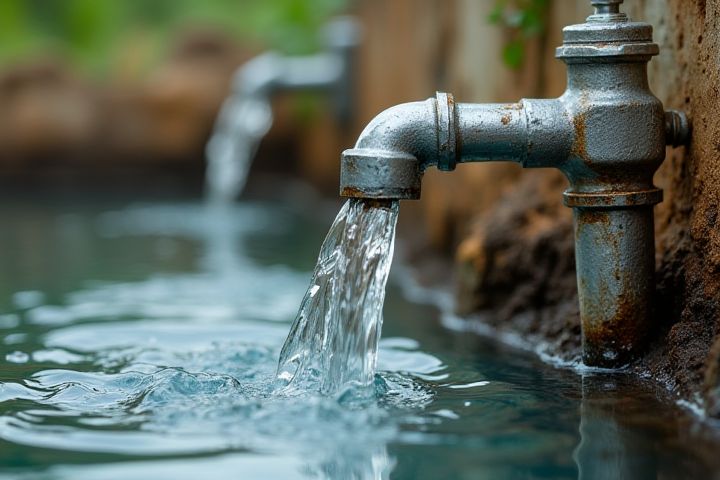
Nigeria boasts a diverse range of water resources, including rivers, lakes, and groundwater aquifers. The Niger River, one of Africa's longest rivers, flows over 4,180 kilometers and serves as a vital source of water for agriculture and transportation. Lake Chad, once one of Africa's largest freshwater lakes, is crucial for supporting local ecosystems and communities but has faced significant shrinkage due to climate change and water management practices. Groundwater, which constitutes about 70% of the country's drinking water supply, is primarily accessed through boreholes and hand-dug wells, highlighting the need for sustainable management to prevent over-extraction. Effective policies on water conservation and distribution are essential for ensuring equitable access to water resources across Nigeria's regions, supporting both urban and rural populations.
River Niger
River Niger is Nigeria's most vital water resource, serving as a key artery for agriculture, fishing, and transportation. Stretching over 4,180 kilometers, it supports various ecosystems and communities along its banks, playing a crucial role in local economies. The river's basin, rich in biodiversity, sustains numerous fish species while also providing irrigation for crops like rice and cassava. Effective management of River Niger is essential for addressing challenges related to water quality, accessibility, and the impacts of climate change on Nigeria's water supply.
River Benue
River Benue, Nigeria's second-largest river, plays a pivotal role in the country's water resource management. Stretching approximately 1,400 kilometers, it serves as a vital source of water for agriculture, fishing, and transportation for local communities. The river's watershed supports diverse ecosystems and supports the livelihoods of millions, particularly in the Middle Belt region. Investing in sustainable management practices for River Benue is essential to preserving its ecological health and ensuring a reliable water supply for future generations.
Lake Chad Basin
The Lake Chad Basin is a critical water resource in Nigeria, providing essential livelihoods for millions through agriculture, fishing, and livestock. Historically a vast freshwater lake, its shrinkage poses significant challenges, including reduced biodiversity and increased conflicts over water access among local communities. Efforts to restore and sustainably manage the basin are vital, involving collaboration among Nigeria, Cameroon, Chad, and Niger. Your participation in conservation initiatives can help safeguard this vital ecosystem for future generations.
Kainji Dam
Kainji Dam, located on the Niger River in Nigeria, is a pivotal water resource that significantly contributes to the nation's hydroelectric power supply and irrigation practices. With an installed capacity of 760 megawatts, it serves as a crucial infrastructure for energy generation, supporting both industrial and domestic needs. The surrounding area benefits from enhanced agricultural productivity due to irrigation facilitated by the dam's reservoir, which plays a key role in food security. Monitoring the ecological impact of the Kainji Dam is essential, as it influences local biodiversity and the livelihoods of communities dependent on the river system.
Cross River
The Cross River in Nigeria is a vital water resource, supporting diverse ecosystems and local communities. Spanning approximately 275 kilometers, it originates from the Obudu Plateau and flows southward to the Atlantic Ocean, offering significant economic benefits through agriculture, fishing, and transportation. The river is home to unique biodiversity, including rare and endangered species, making it crucial for environmental conservation efforts. Effective management and protection of the Cross River's watershed are essential for sustaining its ecological health and supporting the livelihoods of millions who depend on its waters.
Water scarcity issues
Water scarcity in Nigeria poses significant challenges to sustainable development and public health. With over 50 million people lacking access to safe drinking water, the nation's diverse climates and rapid population growth exacerbate the crisis. Initiatives such as the National Water Resources Policy aim to enhance water management, while the role of local communities is crucial in ensuring equitable distribution. Addressing these issues requires a collaborative approach that includes government investment, infrastructure development, and public awareness to mitigate the impact of water scarcity on livelihoods.
Federal Ministry of Water Resources
In Nigeria, the Federal Ministry of Water Resources plays a pivotal role in managing the country's water resources, ensuring sustainable access and distribution. This government entity oversees various initiatives aimed at improving water supply, sanitation, and irrigation systems throughout the nation. Key projects often include the construction and maintenance of dams, as well as the development of policies to protect rivers and aquifers. By prioritizing effective resource management, the ministry contributes to the overall economic growth and public health of Nigeria, impacting communities nationwide.
Irrigation agriculture
Nigeria's water resources play a crucial role in enhancing irrigation agriculture, which significantly boosts food production and sustains livelihoods. The country relies on major rivers, like the Niger and Benue, to support irrigation systems that improve crop yield efficiency. Through innovative irrigation techniques, including drip and surface irrigation, Nigerian farmers can maximize water usage while reducing wastage. As climate variability continues to challenge traditional farming practices, investing in sustainable irrigation infrastructure is essential for ensuring long-term agricultural resilience and food security in Nigeria.
Groundwater extraction
Groundwater extraction in Nigeria plays a crucial role in addressing the country's water scarcity, particularly in rural areas where surface water is unreliable. The nation is endowed with extensive aquifers that provide a significant portion of its drinking water, agricultural irrigation, and industrial needs. Sustainable management practices are essential to prevent over-extraction and maintain the quality of these vital resources. To enhance your understanding, consider the challenges posed by pollution and population growth, which threaten Nigeria's groundwater availability.
Erosion and flooding challenges
Nigeria faces significant challenges regarding water resources, particularly concerning erosion and flooding. Frequent heavy rainfall and poor land management contribute to soil erosion, leading to the degradation of arable land and increased vulnerability to flooding. Urban areas, especially in cities like Lagos and Port Harcourt, are severely affected, presenting threats to infrastructure and public health. Sustainable management practices, such as reforestation and improved drainage systems, are essential for mitigating these issues and ensuring the effective utilization of water resources in the country.
